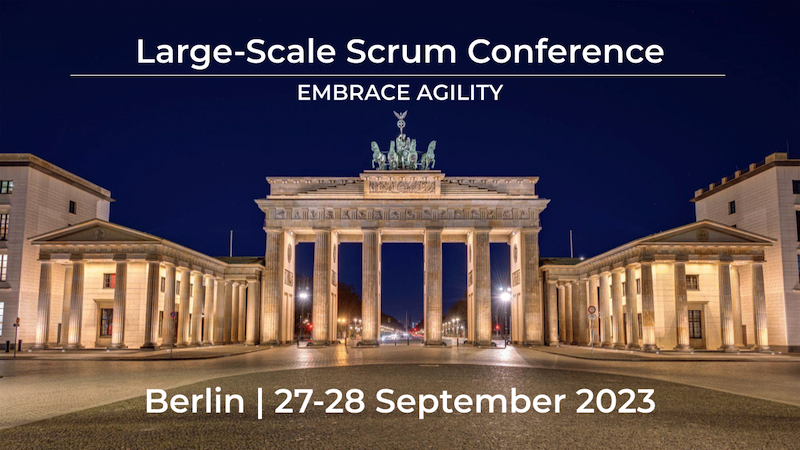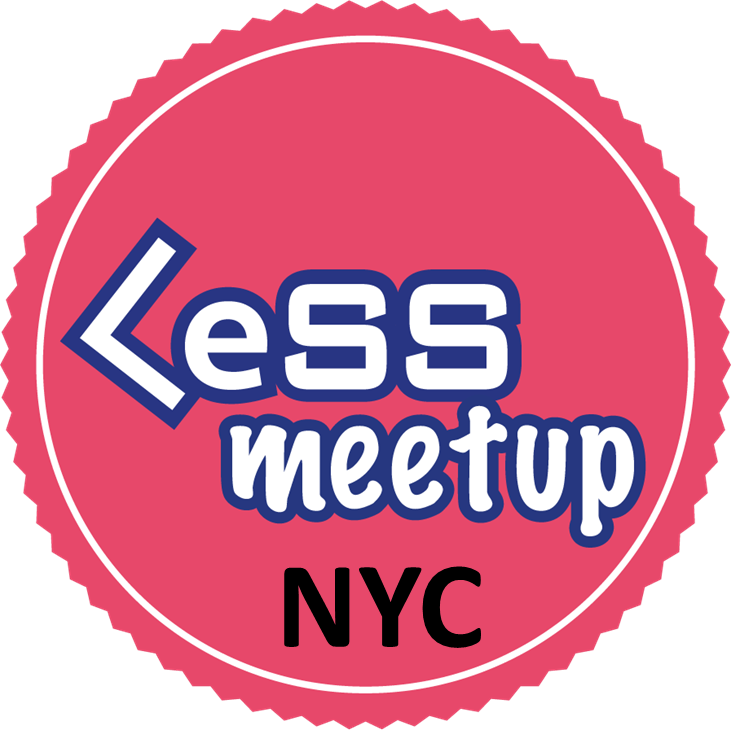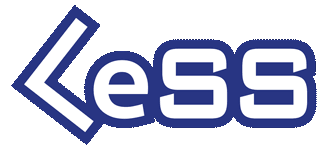LeSS Newsletter - January 2023
January 26, 2023In this newsletter:
- Happy New Year!
- LeSS Conference - Warsaw 2022
- Upcoming LeSS Conference - Berlin 2023
- New York (and Global) community
- Book Review: Thinking in Systems
- Learning Resources
Happy New Year!
2023 already. Let this be a good year.

To me, 2023 seems to be the year of many crossroads. Will the COVID pandemic be behind us? Will work-from-home continue, or will people go back to the office, or will we need to learn to do hybrid working? When people do return to an office, can that office become a more collaborative space so that it is worth going back? Are the current tech lay-offs just laying off the excess employees hired during the pandemic, or is it a permanent shift in the tech industry? Will the war in Ukraine end? The war has accelerated the switch to renewable energy sources, how will that impact product development? This year might provide some answers.
For LeSS, 2023 feels like an exciting year. We have some incredible case studies coming that are currently in draft. We are updating and simplifying the LeSS graphics. We are improving the LeSS site by adding more translations and improved content. The upcoming LeSS Conference in Berlin is exciting. We will explore how and whether LeSS should be conceptually linked to Scrum.
I guess, most of all, I hope companies stop adopting large complex process frameworks and start to truly understand their challenges in product development. To encourage that change, I've included a book review of the wonderful "Thinking in Systems". Let 2023 be the year of systems thinking.
LeSS Conference - Warsaw 2022
The LeSS Conference 2022 happened in the beautiful palace of culture and science on two very cold September days. It was a wonderful conference full with experience reports and new ideas to try out.
Many of the sessions were recorded and some of them have been published already. Bas Vodde provided an different introduction to LeSS from the perspective of maximizing dependencies -- maximizing the collaboration between teams which enables an organization to make dramatic changes in direction (adaptiveness) when needed. John and Roy shared the LeSS adoption for building ship engines at Wartsilla. Dennis shared an update on the LeSS adoption at PandaDoc, a unicorn start-up, while they were in hyper-growth mode. Robert provided a guide to finding the right Product Owner within your organization.
Robert Briese wrote a post on his experiences. More sessions will be available in the future on the LeSS Youtube channel and in the next newsletter.
- Maximizing Dependencies with Interdependent Teams - Bas Vodde
- From Tribes with Dedicated PO to One Product Backlog - John Kop & Roy Klein
- Hypergrowth vs LeSS: experience from the trenches - Denis Salnikov
- How to find a true Product Owner – Robert Batůšek
Upcoming LeSS Conference - Berlin 2023
An update on the upcoming LeSS Conference by Robert Briese...
 The 8th LeSS Conference will take place September 27th & 28th in Germany‘s digital (and actual) capital Berlin, Europe‘s second largest startup ecosystem (after London). In fact, 40% of all AI start-ups are based in Berlin. As always, the event will be held in a historical location, and this time it will be the Funkhaus Berlin, a historic building complex originally built in the 1950s as the headquarters for East Germany's state-run radio and television network. The complex is known for its impressive architecture and acoustics and has been used as a recording studio for famous artists like Brian Eno, David Bowie, and Nick Cave. Next to Bas and Craig, we will have talks by renowned authors and speakers in the world of large-scale product development, like Gojko Adzic or Jutta Eckstein.
The 8th LeSS Conference will take place September 27th & 28th in Germany‘s digital (and actual) capital Berlin, Europe‘s second largest startup ecosystem (after London). In fact, 40% of all AI start-ups are based in Berlin. As always, the event will be held in a historical location, and this time it will be the Funkhaus Berlin, a historic building complex originally built in the 1950s as the headquarters for East Germany's state-run radio and television network. The complex is known for its impressive architecture and acoustics and has been used as a recording studio for famous artists like Brian Eno, David Bowie, and Nick Cave. Next to Bas and Craig, we will have talks by renowned authors and speakers in the world of large-scale product development, like Gojko Adzic or Jutta Eckstein.
If you want to speak at the LeSS conference or are local in Berlin and want to volunteer to help organize the conference, please contact the organization team at https://less.works/less-conferences using the “Contact the conference organizers” button.
Don’t miss this yearly opportunity to network with other LeSS practitioners and learn from some of the best experts in large-scale product development! Register now at: https://less.works/conferenza/conferences/2023-less-conference-berlin-9
New York (and Global) community
The NYC (and Global) community hit 5000 members. Gene Gendel is reflecting on that...
 It all started in 2015, when Craig Larman was delivering his very first Certified LeSS Practitioner class in NYC. He asked me (Gene is here) to help him organize it and I helped him, as well as attended. While attending, I was approached by one of Craig's students who asked me if there were any additional opportunities to continue learning LeSS, after training, through community discussions. This is where it hit me. I decided to create LeSS NYC on meetup.com. I shared the news with some of my friends and network on LinkedIn. In a week, I had my first 100 or so members. A friend of mine offered a free venue and I ran the very first LeSS NYC event on Dec 21st, 2015.
It all started in 2015, when Craig Larman was delivering his very first Certified LeSS Practitioner class in NYC. He asked me (Gene is here) to help him organize it and I helped him, as well as attended. While attending, I was approached by one of Craig's students who asked me if there were any additional opportunities to continue learning LeSS, after training, through community discussions. This is where it hit me. I decided to create LeSS NYC on meetup.com. I shared the news with some of my friends and network on LinkedIn. In a week, I had my first 100 or so members. A friend of mine offered a free venue and I ran the very first LeSS NYC event on Dec 21st, 2015.
At that time, only 13 people attended.
From there on, I started scheduling recurrent events, to discuss various LeSS topics: at least, once a month; sometimes -twice. Our community kept growing steadily and in a few months it was a few hundred strong.
On August 31, 2016, while attending the very first LeSS Conference in Amsterdam, organized by Cesario Ramos, I presented the idea of the LeSS community to other LeSS trainers and conference attendees. This is my outdoor presentation, near one of the canals of Amsterdam. A few other LeSS trainers and conference attendees loved the idea (Shortly, this gave a push to creating many other LeSS meetup-groups around the globe)
Fast forwarding to 2023.
During the last 8 years, our community has grown steadily and surely. So far, we have conducted a few hundred events. We have experimented with a huge variety of event formants: presentations, panel discussions, Q&A, system modeling exercises, case study reviews - just to name a few. We were able to attract top talent and some most galvanizing speakers from across the globe, many of whom were not necessarily LeSS experts but whose views and experience was very relevant to our community: professors, highly ranked executives, Agile Manifesto co-signers, men and women from all types of the industry, where principles of LeSS were relevant.
During COVID, we transitioned to online and grew at a very high pace to become a global community. Today, we run in-person, on-line and hybrid events.
Very epically, on January 1, 2023 we have reached the 5000 members mark! It was a great feeling - almost 8 years after the inception. At this time, we are approaching the 5200 members mark! LeSS NYC is the biggest, fastest growing and most active LeSS community - globally.
Do you plan on forming your own community? When? Please, think about the following when you form a community:
- What makes communities grow organically?
- What represents a good community?
- How do communities function?
- Why should you join a community?
- When should you consider leaving/dissolving a community?
Please, join our community or ask for tips for how to support your own.
Book Review: Thinking in Systems
Another book review from Bas Vodde for the fantastic Thinking in Systems. Original review on Amazon.
 Thinking in Systems is suppose to be an introduction to systems thinking and, while it does a very good job at that, it is so much more. The latter chapters of the book are incredibly insightful for people who do not require an introduction anymore. This, this book is worth reading for anyone who wants to further their understanding of systems thinking, whether you are a novice or already practicing for a while.
Thinking in Systems is suppose to be an introduction to systems thinking and, while it does a very good job at that, it is so much more. The latter chapters of the book are incredibly insightful for people who do not require an introduction anymore. This, this book is worth reading for anyone who wants to further their understanding of systems thinking, whether you are a novice or already practicing for a while.
Most of the book was completed in 1993 but wasn't published at the time (the author wanting to make it perfect?). Unfortunately, the author died suddenly in 2001 and only in 2008 did this little book finally made it to a larger audience. Thanks for the editor (Diana Wright) to pick it up so we can all still enjoy it.
The book consists of three parts: (1) System Structure and Behavior, (2) Systems and Us, and (3) Creating Change -- in Systems and in Our Philosophy.
The first part, Systems Structure and Bahavior, is the introduction to systems thinking part of the book. The first chapter, called The Basics, introduces what systems are and how systems thinking is different from traditional reductionist view of the world. Focus more on the interconnections than the elements. It also introduces a basic modelling technique and uses a simple bathtub system to clarify that. The second chapter, A Brief Visit to the Systems Zoo, expands on the simple systems introduced in the first chapter with slightly more complicated systems and explores their behavior (dynamics). From a bathtub to a thermostat and then to the more typical systems thinking scenarios of inventory of stocks and of world population growth.
The second part, Systems and Us, has three chapters. The third chapter, Why Systems Work So Well, explores three properties of highly functioning systems: (1) resilience, (2) self-organization, and (3) hierarchy. I especially found the descriptions of resilience and self-organization insightful. Particularly how these two properties are frequently sacrificed for purposes of short-term gain in productivity or stability. Chapter four, Why Systems Surprise Us, explores why systems thinking often lead to surprising insights. People are not good at understanding non-linear systems with vague boundaries with lots of delay between actions and effects. I especially enjoyed the discussions about bounded rationality, how individuals act within their limited view of the system and how expanding that systems understanding is a great way of influencing individuals behavior. Chapter five, System Traps and Opportunities, explains several common system patterns, also referred to as archetypes. Examples are the classic Tragedy of the Commons, what might happens when multiple people have a common deplete-able resource, or Drift to Low Performance, how gradually lowering performance expectations lure is in performing worse and worse. This part of the book was very well written and insightful.
The third and last part, Creating Change -- in Systems and in Our Philosophy, takes the basis of the earlier chapters and explores how we can influence systems. Chapter six, Leverage Points -- Places to Intervene in a System, presents twelve ways in which you can attempt to influence a system. These are very insightful and it is amusing to see that within organizations, the most commonly used way, changing parameters or setting goals, is the least effective way to influence a system. Chapter seven, Living in a World of Systems, was my favorite chapter! The author, Donella Meadows, has been involved in systems dynamics for decades and had the opportunity to work with Jay Forrester, who is considered to be one of the 'founding fathers' of modern day systems thinking. Early on, there was hope that systems could be completely modelled and predicted as computers got better. Systems thinking is sort-of the result of the attempt to model real-world systems for computer simulation. While doing this, however, they realized that the systems are far too complex to ever be predictable and cannot be controlled. The idea that you can simple model a perfect system and tell people to 'install' it was dropped though the discipline of thinking about and modelling systems was still incredibly useful. However, instead of controlling the system, we need to learn how to "dance" with it. And that is covered in this last chapter, how to dance with system. How to nudge it, take the feedback, continuously learn from it and use your insights to influence it. That is exactly what I see the practice of systems thinking today being used for. So this last wonderful chapter adds a nice historical perspective and explains the concrete use of systems thinking today and why it is important.
All in all, I loved this little book. I had heard it was good but was surprised how good I eventually found it. In addition to just the content, I loved the usage or words. It was really well written with sentences such as "We don’t even interpret perfectly the imperfect information that we do have," or "We live in an exaggerated present — we pay too much attention to recent experience and too little attention to the past, focusing on current events rather than long-term behaviour." So, yes, definitively one of my all-time favorite systems thinking books. Also an easy recommendation as it is both a reasonable book when you are new to the subject and also still insightful when you consider yourself an experienced systems thinking. One caveat, when you do pick it up, do not expect much examples about in-organization dynamics but instead most examples are 'world problems' like over-fishing, global warming, etc. Recommended reading. Five stars, easily.
Learning Resources
Here are some new selected learning resources and experiences. There is more on the LeSS Youtube channel, and on the LeSS site articles and videos section.
Videos, webinars and podcasts:
- Organizational Design for Large Scale Adaptive Product Development at AgileByExample 2022 - Craig Larman
- Introducing the Gemba Sprint - Ahmad Fahmy
- Illusions and Real Magic - A Story of Projects to Guide Product Development at ALE Krakow - Jurgen de Smet
- Why your scaling Scrum fails, and what you can do about it. - Tomasz Wykowski
- System Thinking: HR and Budgeting implications on Product-centricity - Gene Gendel
- Joe Justice on his career, Tesla, Space X and agility. - John Coleman
- Dreaming, Thinking, Doing @Flix. Ari Tikka & Lucy Karpova interviewed - Greg Hutchings
- Systems Thinking - Kent Beck, Jessica Kerr
- Maximize Learning to Maximize Value Creation - Interview with Bas Vodde - Tomek Wykowski
- Discussion Panel - Stephen Denning, Jutta Eckstein, Craig Larman, Dave Snowden at AgileByExample 2022
- Short Recordings of LeSS - Gene Gendel and James Carpenter
- LeSS Talks: German Big Insurance Case Study Discussion - Wolfgang Steffens at NYC/Global Meet-up
- LeSS Talks: The Vicious Effects of Managing for Utilization, with Konstantin Ribel at NYC/Global Meet-up
- Creating Agile Organizations Interview with Cesario Ramos
Articles
- How Adaptive are Team Topologies? - Alexey Krivitsky
- A de-scaling roadmap for agile teams - Carl Rogers
- Watch out, Waterfall Ahead! The Truth about SAFe - Pawel Huryn
- 5 Antipatterns to Look For in Scrum Master Job Ads - Robert Batusek
- Leader vs Scrum Master, what is the difference between a scrum master and an agile coach? - John Coleman
